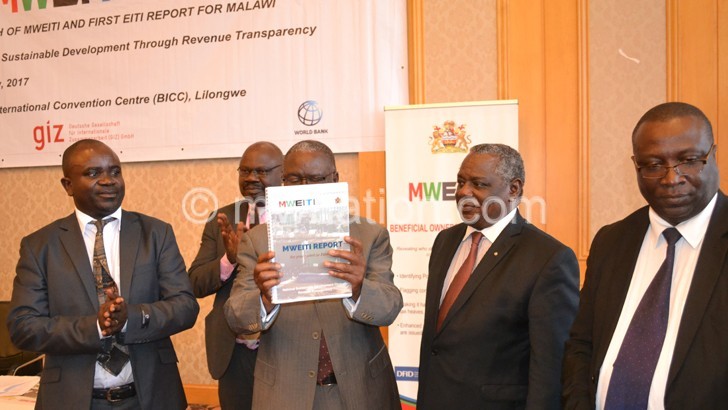K810m mining revenue ‘missing’
Malawi’s first Extractive Industry Transparency Initiative (EITI) report has shown that about K800 million revenue declared by mining companies in 2014 cannot be reconciled in government accounting books.
The report, launched in Lilongwe yesterday, said the unreconciled revenue is equivalent to about 43 percent of the total revenue government generated from the extractive sector in 2014 alone.
In all, K499 100 509 from the Department of Mines (DoM) revenue and K1 754 146 1 900 from Malawi Revenue Authority (MRA) has not been reconciled from a total of K6 billion government declared.
Reads the report in part: “After adjustments and reconciliation work, a net difference of K810 million, representing 34 percent of government revenue remained unreconciled.”

Declarations made by government entities, according to the report, were based on their statements, but the financial statements were yet to be audited by the National Audit Office (NAO).
The report documents that the figure auditors for EITI first raised was higher, but the gaps identified initially were analysed and adjusted where the relevant supporting documents were provided by reporting parties. Thus, the figure was reduced from K1.142 billion or 19 percent of the total amount declared by the government to K810 million.
In his brief to journalists after presiding over the official launch of the report, newly-appointed Minister of Natural Resources, Energy and Mining Aggrey Masi said government will investigate the discrepancies.
He said: “I am hearing about the figures for the first time. Now that I am there [at the helm of the ministry], I will try to figure out what happened. We will ensure there is accountability and transparency.”
In his address during the function, Masi described the report as government’s commitment to transparency.
He said government will soon table in Parliament the revised Mining Bill to improve efficiency in the sector.
Recently, President Peter Mutharika signalled great intent to bring accountability and transparency on how revenue is generated and accounted for in the mining sector.
Unveiling the report yesterday, mining expert and member of the Malawi Extractive Industry Transparency Initiative (Mweiti), Grain Malunga, said the report raises questions about the accuracy of the data submitted by companies in terms of production at various mines nationwide.
He said: “There is a difference in the amounts in receipts issued, bank statements and amounts claimed to have been paid by companies. There is a need to improve on the reliability of the reports.
“Reporting deadlines were not met by government departments and companies. But this is no surprise since this was the first report and there were still suspicions between the various stakeholders.”
Germany Deputy Ambassador Thomas Staiger welcomed the report as a sign of Malawi’s commitment to address challenges, promote transparency and accountable management of the extractive sector.
He said: “Natural resources and raw materials offer huge opportunities for social, political and economic development. Yet, where there is poor governance, these resources can also become the cause for corruption, environmental pollution or social conflict and the poor are not benefiting from the revenue generated.”
According to the 2017 Annual Economic Report, the combined sectors of agriculture, forestry and fisheries accounted for 29 percent of the gross domestic product (GDP) in the 2014/15 financial year.
On the other hand, mining and quarrying sector was projected to grow by 1.6 percent in 2017 compared to 0.4 percent in 2016 and 1.1 percent in 2015. n





